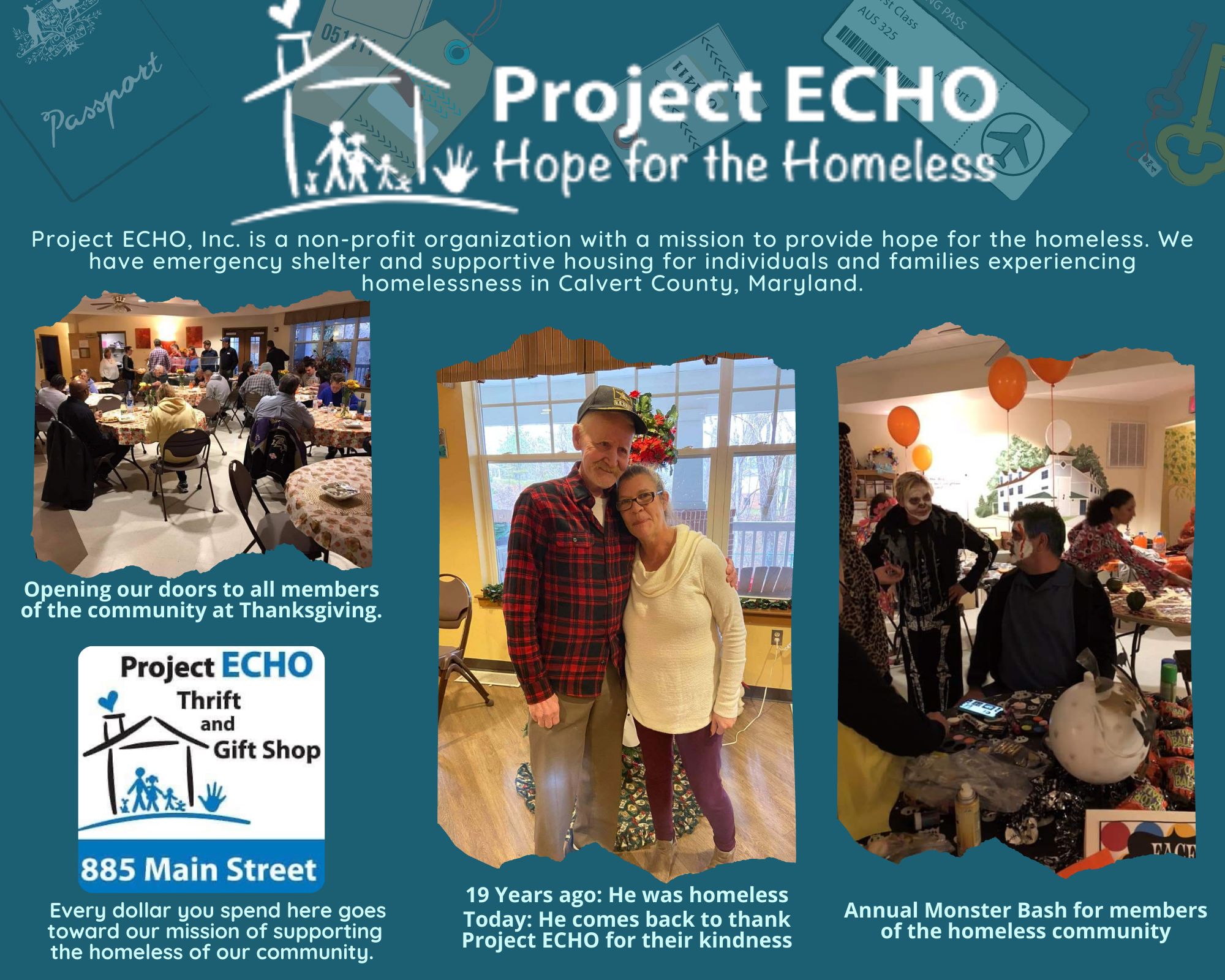Nonprofit Spotlight
Nonprofit Spotlight

Project ECHO, Inc. is a 501(c)(3) nonprofit located in Calvert County. According to the organization’s website, its mission is to provide hope for the homeless. The nonprofit offers both emergency shelter and supportive housing for people who are homeless.
The organization was founded in 1992 after a task force of the Ecumenical Council of Calvert County established a homeless shelter. Project ECHO was given its name since ECHO is an abbreviation for the Ecumenical Council for the Homeless. In 1993, the nonprofit’s first emergency shelter opened. Project ECHO’s current location opened in 2010, which has enough room to house over 40 people.
The shelter is called the ECHO House. It contains smaller rooms for individuals or a few people and larger spaces for families. All residents are given essential products such as food, clothing, and sanitary products. They are also given help with their individual situations. Additionally, they can access employment and education programs, and health and wellness professionals.

For admission into the ECHO House, individuals must visit the Department of Social Services to get a shelter referral. Afterward, they can call during weekday office hours or visit the ECHO House location. Either way, proof of a referral and a photo ID must be provided. It is important to note that having a shelter referral does not automatically mean being able to stay in the shelter. The ECHO House has limited space, and sometimes there is none left for new residents.
From the day they enter the shelter, residents can stay for up to 45 days. After this time period ends, they can apply to stay for another 45 days. However, this is meant for residents who work towards their goals and have had no incident reports. People who cannot stay in the shelter include individuals with an open warrant, those addicted to alcohol and/or drugs, and registered sex offenders. These rules are meant to protect those living in and working at the shelter.
Project ECHO provides more assistance to residents other than the shelter. For example, the shared-living housing program gives people a place to permanently live. This program is for residents who cannot find or keep their own housing. Residents are required to pay for and maintain their property. Oxford Housing also exists to help individuals recover from addictions in a group setting. House members support each other, make decisions together, and pay for expenses. Individuals can stay in the Oxford Houses as long as they do not use alcohol and/or drugs.

For those interested in helping the homeless, there are several ways to help Project ECHO with the cause. One major way to assist is through donating money. Methods of doing this include giving online, using mobile apps, mailing checks to the nonprofit’s P.O. box, and more. Another way to help is by donating items and food. To know which items are needed every day, people can view the wish list on the website. Food that may be donated includes grocery store products, leftovers from events, and food made by meal providers.
A third way to give aid is by giving items to the organization's Thrift and Gift Shop. The shop accepts items such as clothes, small furniture, and more. Lastly, time donations can be made through volunteering. People of all ages are welcome to volunteer. Available positions include being a shelter monitor, working at the thrift and gift shop, and providing meals. Additional ways to help and extensive information about all methods are listed on Project ECHO’s website.
Ultimately, the nonprofit has made a profound difference in the lives of people who were once homeless. This impact is enabled through so much donated time and resources being used to benefit those in need. Here is a story from Project ECHO’s website, which shows the nonprofit’s power to change a person’s life for the better:
“I am 56 years old and for the first time in a very long time I am doing pretty good, which is great to me when I look back and see again how bad I screwed up my life, which you only get one of.
I arrived at Project ECHO after my release from prison. I didn’t want to return to where I grew up. I heard of this place when I was in the Southern Maryland pre-release unit. I was released on a Friday, and I came to Ms. Lori’s doorstep and was told there were no beds open, and I would have to wait ‘till Monday.
I ended up back where I spent most of my time, it was raining and dark, and I didn’t know what to do. I stopped at a little bar I know and got some cigarettes, a pint of Jack Daniels, and two beers. I went and sat in a tunnel, drank the stuff, and tore up all my prison papers.
Then, walking toward my old stomping grounds, I see a street. On that street is a house I know, a place to go and be out of the rain and cold. But it is also a crack house, a shooting gallery, and lots of other things. If I go there, I know I’ll end up just like before, strung out on heroin, crack, and liquor. I’ll end up stealing again, not seeing my parole officer, and a warrant would be issued for parole violation. I’d be living day by day, till I either died, got killed, or ended up back in prison.
I didn’t want that, so I kept walking past that street. I went to a bridge and slept. The next day, a friend picked me up and let me stay with them ‘till Monday and they brought me back to Project ECHO. Had I not gone back I don’t know where I’d be. I do know my life would not be as good as it is right now, and my future is actually looking pretty good.
I did my intake interview with Miss Lori, who seemed skeptical of me, but after talking and her laying out the do’s and do-nots, she allowed me in and gave me a bed. Again, I thank God and Lori. I thank the whole Project ECHO staff for just being there, I thank all the churches, civic groups, Boy Scout and Girl Scout troops, and everyone else that donates their time, help, support, and love to Project ECHO. Since I’ve been there, I’ve been blessed with meeting a lot of really decent people.
Through this program, I was able to save money for when I left. I learned how to start a bank account, pay bills, budget, pay insurance on a vehicle, work a steady job, and basically live a normal life, which I had never done. I spent 27 years of my life in prison. I’d stay out for a while and end up back in prison for violating parole. I wouldn’t let go of drugs and alcohol, I wouldn’t change people, places, and things. Now I have, and I thank God every day for this new life and for Project ECHO.
For me, I will continue to always strive to do better for myself, which is Project ECHO’s goal. I will always be grateful for being allowed to enter the program, and I will always try to help another person in a bad way, as Project ECHO helped me.”
For more information about Project ECHO, visit the website: projectecho.net
Follow Project ECHO on Facebook and follow Project ECHO Thrift and Gift Shop on Facebook and Instagram.
Would you like your nonprofit featured in an upcoming Spotlight? Submit your request
 my.CSMD
my.CSMD